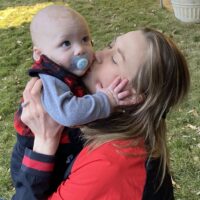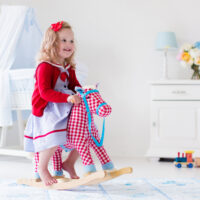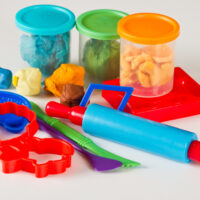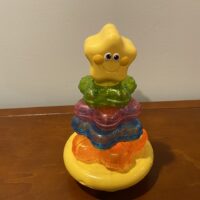There is something so magical about that four-letter word! Hearing your baby utter the word “mama” for the first time is a magnificent moment for any mom! Unfortunately, some of us have to wait a little bit longer than others to hear this two-syllable term. Thankfully, there are ways to coax your little one into start to talk sooner! Here are the top techniques to teach your baby how to say mama.
Let’s Talk About Milestones
4-6 Months
Milestones are developmental periods in which most children begin to exhibit certain behaviors or perform specific skills. In terms of talking, babies begin babbling between four and six months of age. This is a time where they are exploring their ability to make various sounds and start mimicking familiar noises. However, they have no real understanding of the meaning behind these sounds.
7-9 Months
Once babies reach seven months of age, they can begin to string together certain consonant and vowel combinations. Keep in mind, while it is completely possible that your baby will utter the word “mama” at this age, she likely has no idea what the term actually means.
10+ Months
However, as they reach their ten-month mark, they start to understand the words that you are saying to them. This is an extremely important moment that leads to your baby finally uttering their first real words around their first birthday.
It is important to remember that this is a general time frame and that every baby is different. Many kids wait until eighteen months or even two years old and that is perfectly normal. It is only after two years of age that the lack of conversing becomes a problem. Lastly, if you have a little girl it is likely that she will start chatting sooner than if you have a boy.
Boost Language Development
First and foremost, if you want your baby to start talking, you have to talk to them. Read the books, sing to them, explain what you are doing while conducting various activities like cooking or cleaning, and take the time to point out objects and vocalize their name. Word association is extremely important for teaching your baby how to say mama.
Repeat Noises
Practicing the Mmmh sound is imperative for learning to say the word mama as well. Therefore, over accentuate the noise as well as the word when using it. Also, don’t forget to sound it out. As your baby mimics you, this will help to build the muscles in her mouth and lips to aid in her eventually articulating the word.
If your baby says “ma”, she is halfway there! The goal is to make eye contact when your baby utters the first half of that beautiful word and repeat it back to her! The more you repeat noises, the better! Make sure to smile and nod when she does this.
Make a point to utilize the word mama throughout each day. Repetition is key in learning any new skill and you want her to recognize the term.
Gesture To Yourself
First, every time you say mama, pat your chest with each syllable. Babies start to understand gestures between eight and nine months. Therefore, you want to gesture to yourself each time you use the word. Moreover, when other relatives call you mama in front of the baby, make sure that they do the same! Pointing at you or touching your arm while verbalizing your title can build the word association!
Show Your Baby Mama
Next, take photos and videos of yourself and show them to your baby! Ask her “Who is that?”. Wait a moment and then respond with “Mama!”. The key is to only use THAT word. Hence, your response should not be “That’s Mama” or “It’s your Mama”. Focus on the basics!
On this note — Asking your baby to “Say Mama” is also not going to help your cause. You need the focus to be solely on the label and nothing else.
Another way to build the word-to-object connection is to play games! Peek-A-Boo is a fantastic way to learn this term. Hide your face with your hands, behind a book, or slip behind a door and again ask “Where’s Mama?”. Then when you reappear say the magic word! We mentioned the importance of repetition and this is an easy way to achieve it.
Finally, play the name game! Throughout dinnertime or family gatherings, take the time when it is quiet to ask where each individual is around the room. Thus, for example, you would ask “Where’s Dada?”.
Give them a minute to ponder and then excitedly point out Dada in the room! Repeat this with “Mama”, “Grammy”, “Sissy” or anyone else around. This teaches your baby that each person has a different name and further builds those associations.
Engage The Senses
Research shows that by implementing sensory play, you help to build the nerve connections in your child’s brain. This can greatly support language development. Thus, when working on word association, make sure that you are facing your baby, keeping eye contact, and smiling throughout the process.
As mentioned above, say the word when she is looking directly at you and reference yourself while doing it. This allows her to see you while hearing the word. Next, take her hand and place it against your lips. Say mama again. This allows her to feel the action of making the noise. The sensation of the vibration on her skin will further engage her memory.
Utilize Positive Reinforcement
Positive reinforcement tells your baby that she is doing something good and should do it again. Therefore, as your sweet baby begins to recognize the connection and repeat the word Mama back to you, praise her! Hugs, clapping, smiling, and lifting her up in the air will reinforce this action and make her want to do it again!
FAQs – How To Teach Your Baby To Say Mama
Do babies normally say “dada” first?
While rumor has it that dads will get recognition first, this is solely based on how often they hear the word. In times past, babies would say “dada” first because they were home with their mom who was talking about their dad regularly. If your spouse takes the initiative to refer to you as mama frequently, it is actually a much easier word to say.
Why? All that it requires is the opening and closing of one’s mouth. Conversely, in order to say dada, the tongue must be engaged, which can require more concentration and practice.
At what age should I worry that my baby is not talking?
Each child is going to develop at different speeds. Some will be overachievers and others will be late bloomers. While the average age for a child to start talking is at twelve months, there is nothing wrong with them waiting to start conversing up until their second birthday. However, once they surpass this mark, it is best to talk to your pediatrician about this speech delay.
What are other ways that I teach my baby to say mama?
The goal is to limit as much screen time as possible and have only a small amount of allotted time for electronic toys. This ensures that your baby has ample one-on-one interaction with live people and the time to read books and engage in sensory play. These types of activities can help in brain development, thus stimulating their language and social skills.
Final Thoughts
In order to teach your baby how to say mama, you need to find fun and interactive ways to engage with them. It is also important that you help them draw connections with the word and the person. Otherwise, they may be able to repeat the term like a parrot, but they won’t actually understand what they are saying. Jimmy Fallon has a fantastic line of books, one of which is tailored for this exact project!
Moreover, learning this word is an extremely important moment. It solidifies that your child knows who to beckon for when a problem arises in their life. This can help to better guarantee that their needs are met and that they remain safe. It is also an extremely exciting milestone for YOU!
Most importantly though, don’t force this moment. Your baby will show you signs that they are getting ready to talk. These include the aforementioned coos and babbles as well as stringing together speech sounds. If they are not showcasing these aptitudes just yet, then they are likely not ready to say the word mama at this time. Be patient. It will happen when you least expect it!






